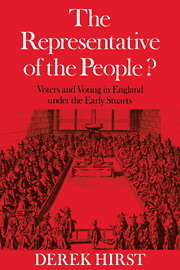Book contents
- Frontmatter
- Contents
- Acknowledgements
- Abbreviations and notes
- 1 Introduction
- PART I THE ELECTORATE
- PART II ELECTIONS
- PART III AFTER THE ELECTION
- Appendices
- I Constituencies experiencing franchise disputes 1604-41
- II Case studies of disputes
- III The borough franchises in 1641
- IV Contested elections
- V Numbers of voters
- VI Voting and occupations in Hertford
- VII The provisions of bills to regulate elections
- VIII The arguments for a wider franchise
- Notes
- Bibliography
- Index
I - Constituencies experiencing franchise disputes 1604-41
Published online by Cambridge University Press: 15 December 2009
- Frontmatter
- Contents
- Acknowledgements
- Abbreviations and notes
- 1 Introduction
- PART I THE ELECTORATE
- PART II ELECTIONS
- PART III AFTER THE ELECTION
- Appendices
- I Constituencies experiencing franchise disputes 1604-41
- II Case studies of disputes
- III The borough franchises in 1641
- IV Contested elections
- V Numbers of voters
- VI Voting and occupations in Hertford
- VII The provisions of bills to regulate elections
- VIII The arguments for a wider franchise
- Notes
- Bibliography
- Index
Summary
Where the events are discussed in the text, or in Appendix II, below, no further details are given here.
SP = Short Parliament; LP = Long Parliament.
Abingdon. SP. Not decided.
Bedford. SP and LP.
Bewdley. LP. Attempts by freemen to break corporation franchise: not decided by House of Commons.
Bletchingley. 1624.
Bossiney. LP.
Boston. 1628.
Bridgnorth. 1610. Attempt to extend franchise to inhabitants at large on grounds of phrasing of charter? Not decided.
Bridport. 1625? 1628.
Bristol. 1625. LP. There is little contextual evidence for the disputes here. The freemen pressed for the vote in 1625 in the midst of depression; they appear to have gained it as a result of their pressure in October 1640. The wordings of the indentures then and for the by-election of 1642 (the corporation ‘cummultis aliis’, ‘et multi alii’, made the elections) imply as much; they were certainly enfranchised by the Restoration, and apparently in 1654. The absence of any reference in the corporation archives to disorder at the intervening elections, such as that which was made in 1625 and 1640, indicates that the freemen's success was in 1640.
Cambridge. 1621–5. LP?
Cambridge University. 1614. 1625. The Heads of Houses interpreted the Elizabethan statutes to mean that members should be chosen in the same manner as the Vice-Chancellor, which would effectively have destroyed the role of the MAs—it was a specious argument, for the University had not been represented at the time of the statutes, so parliamentary elections could not have been intended then.
- Type
- Chapter
- Information
- The Representative of the People?Voters and Voting in England under the Early Stuarts, pp. 195 - 196Publisher: Cambridge University PressPrint publication year: 1975



